Difference between revisions of "Modules:Welcome-Documentation-3.4"
| Line 44: | Line 44: | ||
</small> | </small> | ||
| − | * '''Load''' | + | * '''Load Data''' |
| − | **Volumes: | + | **Volumes: Slicer3 can read most existing image acquisition formats such as dicom, jpeg or tiff, and image processing formats such as nrrd, analyze or nifti. Link to the panel Load of the module Volumes. For Dicom images, you may also use the command File/AddVolume from the main menu. |
| − | **Models | + | **Models:3D reconstructions of anatomical structures. Link to the panel Load of the module Models. |
| − | **Scenes | + | **Scenes: Combination of volumes and models. Use File/Load Scene from the main menu |
| − | * '''Save''' | + | * '''Save Data''' |
* '''Common Activities''' | * '''Common Activities''' | ||
| − | **Loading and | + | ** '''Core Activities''' |
| − | ** | + | **Data Loading and Visualization: Link to the same named tutorial |
| + | **Data Fusion: Link to the registration tutorial and to the registration subpanel | ||
| + | **Data Segmentation: Link to the interactive editor module and to the matched tutorial | ||
**Scenesnapshots: Link to the two icons. Slicer allows to save all the parameters of the scene into a snap shot that can be recovered later. | **Scenesnapshots: Link to the two icons. Slicer allows to save all the parameters of the scene into a snap shot that can be recovered later. | ||
| − | ** | + | |
| + | ** '''Specialized Activities''' | ||
**Automated Brain Segmentation: Link to the EM tutorial and the segmentation subpanel | **Automated Brain Segmentation: Link to the EM tutorial and the segmentation subpanel | ||
| − | ** | + | **Diffusion MRI processing: Link to the tutorial and to the DWI/DTI subpanel |
| − | **Tracking and IGT research | + | **Tool Tracking and IGT research |
| − | + | ||
| + | To learn more: Link to the Slicer3 101 compendium and to the NA-MIC events page | ||
* '''Community''' | * '''Community''' | ||
| − | **Mailing Lists: Link to the mailing lists signup page | + | **Mailing Lists: Link to the user and developer mailing lists signup page |
**Events: Link to the NA-MIC events page | **Events: Link to the NA-MIC events page | ||
**Feature requests and bug reports: Link to mantis bug tracker | **Feature requests and bug reports: Link to mantis bug tracker | ||
Revision as of 17:12, 26 February 2009
Home < Modules:Welcome-Documentation-3.4Return to Slicer 3.4 Documentation
The "Welcome" Module
General Information
Background: this is intended to be the initial 'Home' module when slicer starts up (expert users can override this by setting the Home to their favorite module).
Module Type & Category
Type: Interactive
Category: Core Module
Authors, Collaborators & Contact
- Author1: Wendy Plesniak Affiliation & logo, if desired
- Ron Kikinis Affiliation & logo, if desired
- Steve Pieper Affiliation & logo, if desired
- Sonia Pujol Affiliation & logo, if desired
- Contact: name, email
Module Description
This module is intended as a welcome screen and will be set as default on all download versions of Slicer.
Detailed Description
This is a draft. The double stars entries in the table below pop up a floating window with more info.
Welcome to 3D Slicer 3.4. (logo)
Slicer3 is a free open source software platform for medical image processing and 3D visualization of image data.
This page contains some information and links to get you started. Please see our website, http://www.slicer.org for additional information.
3D Slicer is distributed under a BSD style license. See here for the full license.
The Software has been designed for research purposes only and has not been reviewed or approved by the Food and Drug Administration or by any other agency.
- Load Data
- Volumes: Slicer3 can read most existing image acquisition formats such as dicom, jpeg or tiff, and image processing formats such as nrrd, analyze or nifti. Link to the panel Load of the module Volumes. For Dicom images, you may also use the command File/AddVolume from the main menu.
- Models:3D reconstructions of anatomical structures. Link to the panel Load of the module Models.
- Scenes: Combination of volumes and models. Use File/Load Scene from the main menu
- Save Data
- Common Activities
- Core Activities
- Data Loading and Visualization: Link to the same named tutorial
- Data Fusion: Link to the registration tutorial and to the registration subpanel
- Data Segmentation: Link to the interactive editor module and to the matched tutorial
- Scenesnapshots: Link to the two icons. Slicer allows to save all the parameters of the scene into a snap shot that can be recovered later.
- Specialized Activities
- Automated Brain Segmentation: Link to the EM tutorial and the segmentation subpanel
- Diffusion MRI processing: Link to the tutorial and to the DWI/DTI subpanel
- Tool Tracking and IGT research
To learn more: Link to the Slicer3 101 compendium and to the NA-MIC events page
- Community
- Mailing Lists: Link to the user and developer mailing lists signup page
- Events: Link to the NA-MIC events page
- Feature requests and bug reports: Link to mantis bug tracker
Acknowledgment
NAC, NA-MIC, NCIGT, MBirn, Fbirn
